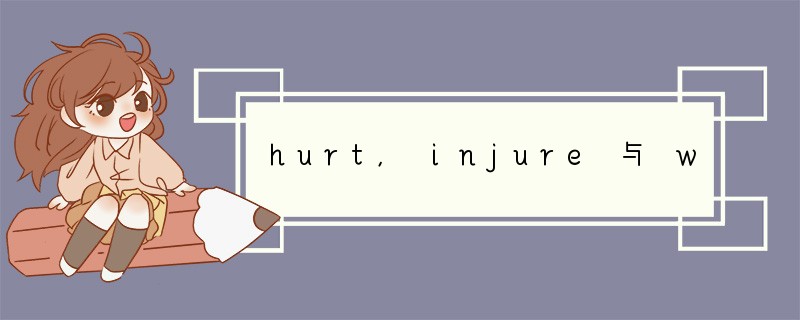hurt, injure 与 wound
时间:2024-01-05 14:22:42 栏目:学习方法
hurt, injure 与 wound
三者均可表示“受伤”或“伤害”,区别如下:
1. hurt 属普通用词,指身体上的受伤,可轻可重,常带有较强的疼痛感。另外它还经常用于比喻义,表示精神或感情上的伤害。如:
Are you badly hurt? 你伤得厉害吗?
You’ve hurt her feelings. 你伤害了她的感情。
I’m hurt not to have been invited. 没有邀请我,我很不痛快。
2. injure 与 hurt 的含义较为接近,但更正式,主要指人在意外事故中受到伤害。如:
In the accident 10 people died and 20 were seriously injured. 在这次事故中,有10人死亡,20 受重伤。
有时也用于比喻义。如:
Smoking will injure your health. 抽烟会损害你的健康。
Her refusal injured his pride. 她拒绝他,伤害了他的自尊心。
3. wound 主要指外界暴力或用武器造成的较重的身体上的伤害,多用于战斗或作战等场合。如:
The soldier was badly wounded in the head. 这位士兵头部受了重伤。
In a war there are many more wounded than killed. 在战争中受伤的远比死亡的人多。
注:wound 有时也用于精神上的伤害,但不如 hurt 常见。如:
Never needlessly hurt [wound, injure] the feelings of anybody. 千万不要无谓地伤害任何人的感情。
4. 从用法上看,过去分词 wounded 和 injured 均可用于名词前作定语,而用作过去分词的 hurt 则很少这样用。如:
The wounded [injured] soldier was well looked after. 这个受伤的士兵受到了很好的照顾。
另外,the injured 和 the wounded 均可用作名词,意为“受伤的人”,但一般不用 the hurt 来表示类似意义。如:
The injured[wounded] were sent to hospital. 受伤的人被送往医院。
版权声明:
1、本文系转载,版权归原作者所有,旨在传递信息,不代表看本站的观点和立场。
2、本站仅提供信息发布平台,不承担相关法律责任。
3、若侵犯您的版权或隐私,请联系本站管理员删除。
4、本文由会员转载自互联网,如果您是文章原创作者,请联系本站注明您的版权信息。

 订阅
订阅